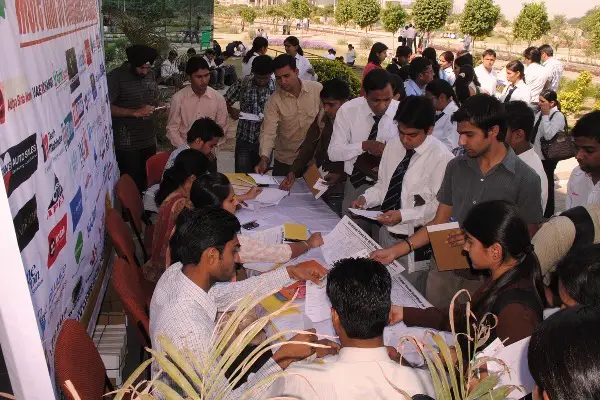Introduction
Unemployment is a major issue that has a negative impact on societies and economies all over the world. Particularly in India the issue of unemployment presents a significant challenge to the development of the country. This article examines the many aspects that is unemployment India and examines its causes, impacts and solutions. If we can tackle this issue in a comprehensive manner and systematically, we can move to create a more welcoming and prosperous society.
Unemployment Problem in India
Unemployment in India is a situation that people who are eager and able to work but are not able to find job opportunities. The problem is multifaceted and has a wide-ranging impact for families, individuals, and for the nation in general.
Factors that Cause Unemployment
The rate of unemployment in India is affected by a variety of interconnected factors which create a complex. These factors include:
1. Insufficient Skill Development Programs
Lack of effective training programs for skilled workers results in a significant percentage of the population unprepared to meet the requirements of the market. With the development of industries with new technology, the absence of up-to-date capabilities leads to unemployment among numerous people.
2. Rapid Growth in Population

The rapid growth in population of India intensifies the competition for employment. The workforce is growing rapidly, making it difficult in the economic system to create enough jobs to meet the rising population.
3. Educational Disparities
Access to education is not equal and quality hamper the growth of a highly skilled workforce. A large portion of the population is not able to access high-quality education, which hinders their ability to work in different sectors.
4. Economic Slowdowns
Economic recessions and downturns lead to fewer jobs being created across all industries. The slowdowns can increase the rate of unemployment, resulting in large portions of the population without employment opportunities.
5. Technological Advancements
Technology is great for productivity but it also alters traditional employment markets. Digitalization and automation lead to the loss of certain jobs, leaving workers with no alternative options.
Impacts of Unemployment
The issue with unemployment India is a major cause of adverse consequences that go beyond the individual issue of joblessness. A few of these are:
1. Economic Stress
A high percentage of people experiencing unemployment can strain the economy, causing a decrease in consumption and tax revenue. This may result in a decline in economic growth as well as increased investment in unemployment insurance.
2. Social Unrest
The effects of unemployment are often the cause of social turmoil, as people who aren’t able to find work might resort to protests and other types of civil disobedience to voice their displeasures.
3. Mental Health Problems
The psychological effect of unemployment is substantial. Some people experience anxiety, stress, and depression because of financial stress as well as the loss of of sense of.
4. Inequality and poverty
Unemployment perpetuates poverty and creates inequality. With no steady income, people or families have to struggle pay for essential needs, which increases the social divide.
Resolving the Issue
To tackle the issue with unemployment India requires a thorough and multi-faceted strategy. Here are some possible solutions:
1. Promoting the Development of Skill
Making investments in training programs can equip people with the necessary skills to succeed in a variety of sectors. Upskilling and vocational training can make the difference between job demands and abilities of the workforce.
2. Fostering Entrepreneurship
Promoting entrepreneurship could create jobs and boost economic growth. Help for small and new firms can lead to jobs and creativity.
3. Improving Access to Education
Access to high-quality education for all groups of people is essential. This will equip people with the skills and knowledge necessary to be able to get a job.
4. Diversifying the economy
Diversifying the economy through investing in different sectors will reduce the dependence on one sector and provide a variety of opportunities for employment.
5. Labor Market Reforms
Implementing reforms to the labor market that are in harmony with the needs of both employers and employees can help create an environment that encourages job creation and economic growth.
FAQs
Q: What is the current unemployment rate in India?
The unemployment rate in India varies over time but has averaged around 6-7% in recent years. It’s essential to note that this rate can differ between urban and rural areas.
Q: How does technological advancement contribute to unemployment?
Technological advancements can lead to job displacement as automation and AI technologies replace certain manual tasks. However, they can also create new job opportunities in technology-related fields.
Q: What role does government policy play in addressing unemployment?
Government policies play a crucial role in addressing unemployment by promoting economic growth, skill development, and job creation. They can provide incentives for industries to hire and invest in human capital.
Q: How can entrepreneurship help reduce unemployment?
Entrepreneurship encourages individuals to create their own businesses, generating job opportunities for themselves and others. Startups and small businesses can become significant sources of employment.
Q: What sectors are most affected by unemployment in India?
Sectors that rely heavily on manual labor and have low levels of technological integration, such as agriculture and some traditional manufacturing industries, are often more susceptible to unemployment.
Q: What are the potential long-term consequences of high unemployment rates?
High unemployment rates can lead to a decreased standard of living, reduced economic growth, and increased social tensions. They can also hinder a country’s overall development and stability.
Conclusion
The problem of unemployment in India is a complex challenge with wide-ranging impacts. It requires collaborative efforts from government, businesses, and society as a whole to address its root causes and find effective solutions. By investing in education, skill development, and entrepreneurship, India can pave the way for a more inclusive and prosperous future, where opportunities are accessible to all.

